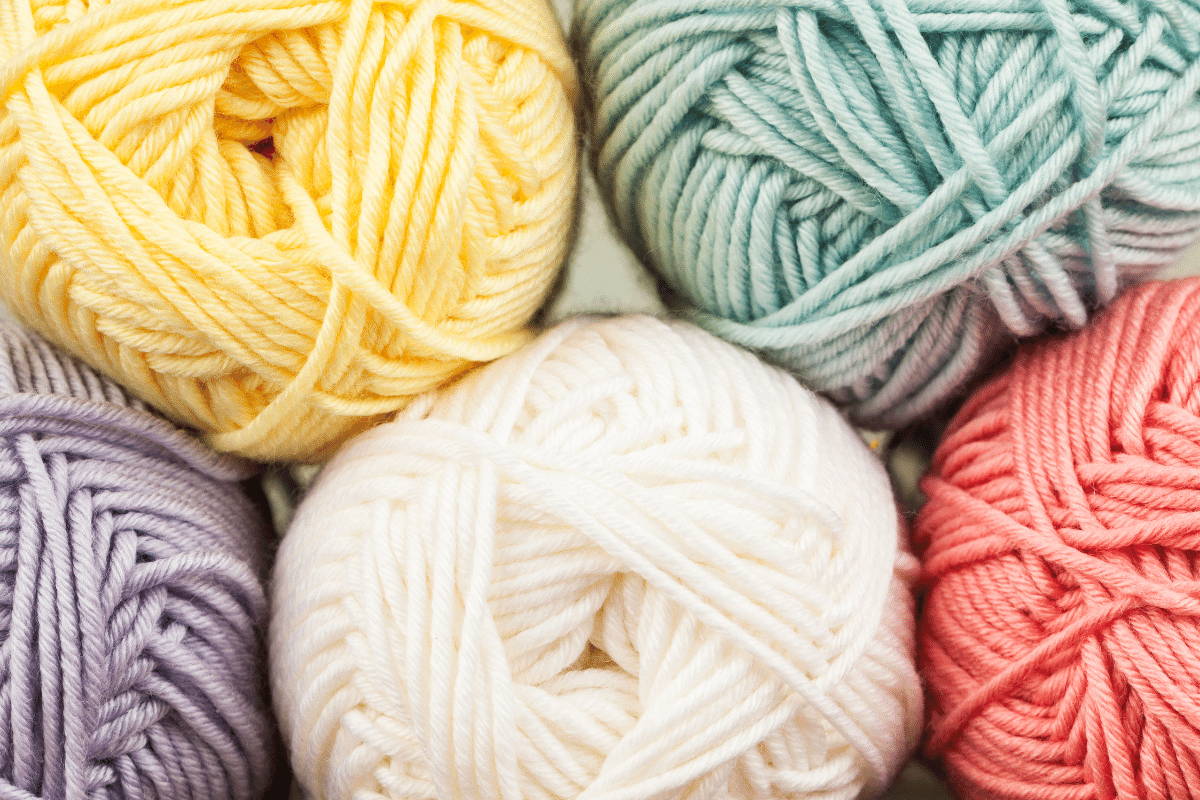Acrylic Vs Cotton Yarn – What’s The Difference?
In knitting or crocheting, crafters come across patterns that require different types of yarn and fabric, depending on the project they’re looking to make. Knowing the differences between them is crucial, as the yarn used can either make or break the final output.
While seasoned crafters will be able to name and distinguish each type of yarn or fabric by touch, beginners may find the variety overwhelming. In this article, we zero in on two of the most popular types of yarn: acrylic and cotton.
Acrylic yarn is a synthetic fiber that is made from petroleum-based products. It is less expensive than other types of yarn and is easy to care for since it is machine washable and dryable. Cotton yarn, on the other hand, is made from the fibers of the cotton plant. It is very absorbent but can shrink when it is wet.

What is Acrylic Yarn?
Acrylic yarn is a synthetic fiber made from a petroleum product called polyacrylonitrile. Its fibers are known for being lightweight, strong, and durable. It is often used as a cheaper alternative to wool and is known for being easy to care for.
Acrylic yarn is used for garments and accessories that will be machine-washed or otherwise subject to rough treatment. It is also popular for baby items because it is soft and hypoallergenic.

Benefits of Acrylic Yarn
Acrylic yarn is often the first choice for knitters and crocheters because of its benefits, which include:
Available in a Range of Colors
One of the best things about acrylic yarn is that it holds dyes exceptionally well and can be available in a wide range of colors, so you can easily find the perfect shade for your project. Whether you're looking for a bright and bold color or amore subdued hue, there's sure to be an acrylic yarn that's exactly the color you're looking for.
Easy to Clean
Acrylic yarn is easy to clean, whichmakes it a great choice for those with allergies or sensitivities.You can clean your acrylic yarn-made items as often as needed,without worrying about their shape and quality being ruined. Acrylicyarn is highly tolerant of detergent and can withstand standardcycles in a washing machine.
Durable
One of the most sought-aftercharacteristics of acrylic yarn is its durability. It can hold upwell to wear and tear, and as a synthetic yarn, won’t turn delicatetoo quickly. Acrylic yarn will last a long time and is a great choicefor items that are intended to be passed down from one person toanother
Warm and Lightweight
Acrylic yarn is a great choice forknitting or crocheting throw blankets because it is both warm andlightweight. This is owing to its characteristic as a synthetic yarn,which gives it a lower density than natural fibers.
Non-Allergenic
Acrylic yarn fibers are smooth and havelow friction. This allows the yarn to slide easily through thefabric, resulting in clean stitches. In addition, acrylic yarn isless likely to split than other types of yarn, which also helps keepstitches neat.
Great Stitch Definition
Acrylic yarn fibers are smooth and havelow friction. This allows the yarn to slide easily through thefabric, resulting in clean stitches. In addition, acrylic yarn isless likely to split than other types of yarn, which also helps keepstitches neat.
Holds Shape
Acrylic yarn doesn't shrink or feltwhen it's washed, so the final product will be able to hold its shapewell.

Disadvantages of Acrylic Yarn
As with other types of yarn, acrylicyarn does have its weak points. But its advantages often outweigh itsdisadvantages. To give you an idea of how to manage your expectationswith acrylic yarn, here are some of its cons.
Less Breathability
Acrylic yarn is best used for items that you don’t plan to wear, like blankets and throws, because it offers less breathability compared to natural yarns.
Traps Water
While acrylic yarn is easy to clean andcan be thrown into the washing machine without issue, it can take awhile for it to dry. It has the tendency to trap water, keeping itwet for longer. Acrylic Yarn for the most part, doesn't wick moistureaway from the skin
Melts Under High Temperatures
With acrylic yarn being a syntheticfiber, it can melt under high temperatures. This is why it’sadvisable to keep your acrylic yarn projects away from fireplaces orkitchen stoves. We don't recommend ironing anything crafted withacrylic yarn.
What is Cotton Yarn?
Cotton yarn is made from cotton fiber.It is soft and absorbent, making it ideal for making clothing andother textile products. Cotton yarn can be used to knit a variety ofitems, including sweaters, afghans, towels, and more.

Benefits of Cotton Yarn
There are many reasons you might optfor cotton yarn for your project. Its breathable, absorbent, anddurable characteristics make it suited for garments and wearableitems.
Breathable
Made from natural fibers that are ableto absorb moisture, cotton yarn keeps the fabric cool and comfortableto wear. It’s incredibly lightweight as well, making it morebreathable than other yarn options.
Stitch Definition
Cotton yarn is easy to work withbecause it’s not elastic, making each stitch well defined andallowing the fabric to settle nicely.
Great Absorbency
Cotton yarn is a popular choice formany different projects due to its absorbency. This means that it cansoak up sweat and moisture, making it ideal for summer garments orfor people who live in warm climates.
Machine Washable
Cotton yarn is not as delicate as othertypes of yarn. Its durable construction allows it to withstandstandard washing machine cycles, without damaging its fabric quality.Because of this, cotton yarn is a good yarn option for garments thatneed to be washed frequently.
Rugged and Durable
Cotton yarn is often lauded for its durability and strength. In fact, many people use it specifically because it can stand up to a lot of wear and tear. Cotton yarn’s fibers are naturally strong, making it ideal for knitting items that will see a lot of use, like clothing or towels.

Disadvantages of Cotton Yarn
Cotton yarn is a top choice among crafters because of its durable construction and breathability. However, it also has its fair share of disadvantages that don’t make it suitable for every project.
Bleeds
If you use different colors of cottonyarn in a project, the colors may bleed into one another when theitem is washed. This makes cotton yarn unsuitable for patterns thatrequire multiple yarn colors. However, if you’re only knitting withone color, this shouldn’t be a problem.
Challenging to Work With
Beginners may find cotton yarn achallenging material to work with because it can be either sticky orslippery based on the the way it's spun. You may find cotton fallsoff plastic needles more often than when knitting with wool. This canbe remedied by using wooden needles, which can hold the yarn muchmore securely. Cotton yarn is also not elastic, so it can be moredifficult to keep an even tension when working with it.
Wrinkles
Pure cotton yarns can wrinkle and crease over time. But to avoid this, you can always opt for cotton blends instead of going for 100% pure cotton yarns.
Conclusion: Acrylic vs Cotton Yarn
Acrylic and cotton are both versatileyarns that can be used for a variety of projects. Each type, however,has its own unique properties and benefits that can make it more orless suitable for certain applications.
Ultimately, it’s important to choosea high-quality yarn made by a reputed manufacturer. This will ensurethat you reap all the benefits of either acrylic or cotton yarn inyour knitting or crocheting project.

